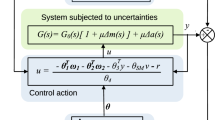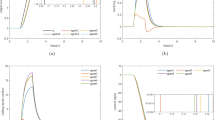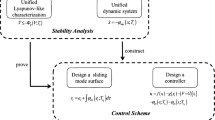Abstract
The filtering fault detection problem for asynchronous switched discrete-time linear systems with mode-dependent average dwell time (MDADT) is investigated in this paper. A series of mode-dependent fault detection filters are designed with respect to each subsystem and are equipped with the switched system to obtain an augmented switched system. For the fact that the switching of the filter lags behind that of the subsystem frequently in actual situations, the resulting augmented switched system is consequently converted into an asynchronous augmented switched system. To guarantee the globally uniformly exponentially stability (GUES) and the H_/H∞ performance of the asynchronous filtering fault detection system, multiple Lyapunov functional and MDADT techniques are then used. The starting instants set of the subsystem is proposed to make it more convenient to apply the MDADT technique. The sufficient conditions for the existence of the designed filter and stability of asynchronous augmented switched systems are given in terms of linear matrix inequalities (LMIs). Finally, the effectiveness of the proposed methodology is demonstrated by two examples.
Similar content being viewed by others
References
D. Liberzon, Switching in Systems and Control, Birkhäuser, Boston, 2003.
Z. Fei, S. Shi, Z. Wang, and L. Wu, “Quasi-time-dependent output control for discrete-time switched system with mode-dependent average dwell time,” IEEE Transactions on Automatic Control, vol. 63, no. 8, pp. 2647–2653, 2018.
H. Lin and P. J. Antsaklis, “Stability and stabilizability of switched linear systems: A survey of recent results,” IEEE Transactions on Automatic Control, vol. 54, no. 2, pp. 308–322, 2009.
D. Koenig, B. Marx, and S. Varrier, “Filtering and fault estimation of descriptor switched systems,” Automatica, no. 63, pp. 116–121, 2016.
R. Ma, H. Pang, L. Fu, and Y. Fan, “Reduced-order observers design for unknown inputs switched systems without strongly detectable of subsystems,” International Journal of Control, Automation, and Systems, vol. 20, no. 4, pp.1275–1282, 2022.
X. Liu and Y. Shuai, “On designing H∞ fault estimator for switched nonlinear systems of neutral type,” Communications in Nonlinear Science and Numerical Simulation, vol. 16, no. 11, pp. 4379–4389, 2011.
A. Chibani, M. Chadli, S. X. Ding, and N. B. Braiek, “Design of robust fuzzy fault detection filter for polynomial fuzzy systems with new finite frequency specifications,” Automatica, vol. 93, pp. 42–54, 2018.
F. Harirchi and N. Ozay, “Guaranteed model-based fault detection in cyber-physical systems: A model invalidation approach,” Automatica, vol. 93, pp. 476–488, 2018.
I. Hwang, S. Kim, Y. Kim, and C. E. Seah, “A survey of fault detection, isolation, and reconfiguration methods,” IEEE Transactions on Control Systems Technology, vol. 18, no. 3, pp. 636–653, 2010.
L. Zhang and H. Gao, “Asynchronously switched control of switched linear systems with average dwell time,” Automatica, vol. 46, no. 5, pp. 953–958, 2010.
J. Huang, X. Hao, and X. Pan, “Asynchronous H∞ filtering fault detection for discrete-time switched linear systems,” Transactions of the Institute of Measurement and Control, vol. 44, no. 1, pp. 314–323, 2022.
M. Hou and R.J. Patton, “An LMI approach to H_/H∞ fault detection observers,” Proc. of the UKACC International Conference on Control, pp. 305–310, 1996
J. Li and G. H. Yang, “Asynchronous fault detection filter design approach for discrete-time switched linear systems,” International Journal of Robust and Nonlinear Control, vol. 24, no. 1, pp. 70–96, 2014.
X. Zhao, L. Zhang, P. Shi, and M. Liu, “Stability and stabilization of switched linear systems with mode-dependent average dwell time,” IEEE Transactions on Automatic Control, vol. 57, no. 7, pp. 1809–1815, 2012.
B. Lu and F. Wu, “Switching LPV control designs using multiple parameter-dependent Lyapunov functions,” Automatica, vol. 40, no. 11, pp. 1973–1980, 2004.
A. S. Morse, “Dwell-time switching,” Proc. of the 2nd European Control Conference, pp. 176–181, 1993.
J. P. Hespanha, and A. S. Morse, “Stability of switched systems with average dwell-time,” Proc. of the 38th IEEE Conference on Decision and Control, vol. 3, pp. 2655–2660, 2021
J. P. Hespanh, “Uniform stability of switched linear systems: Extensions of LaSalle’s invariance principle,” IEEE Transactions on Automatic Control, vol. 49, no. 4, pp. 470–482, 2004.
Y. Zhu and W. X. Zheng, “Multiple Lyapunov functions analysis approach for discrete-time-switched piecewise-affine systems under dwell-time constraints,” IEEE Transactions on Automatic Control, vol. 65, no. 5, pp. 2177–2184, 2019.
X. Zhao, L. Zhang, P. Shi, and M. Liu, “Stability of switched positive linear systems with average dwell time switching,” Automatica, vol. 48, no. 6, pp. 1132–1137, 2012.
L. You, J. Fang, and X. Mu, “Stability of switched positive linear systems with actuator saturation under mode-dependent average dwell time,” International Journal of Control, Automation, and Systems, vol. 18, pp. 817–823, 2020.
L. Chen, Y. Zhu, and C. K. Ahn, “Adaptive neural network-based observer design for switched systems with quantized measurements,” IEEE Transactions on Neural Networks and Learning Systems, pp. 1–14, 2021
J. Cheng, J. H. Park, and Z. G. Wu, “A hidden Markov model based control for periodic systems subject to singular perturbations,” Systems and Control Letters, vol. 157, pp. 105059, 2021.
S. Rathinasamy, S. Murugesan, F. Alzahrani, and Y. Ren, “Quantized finite-time non-fragile filtering for singular Markovian jump systems with intermittent measurements,” Circuits, Systems, and Signal Processing, vol. 38, pp. 3971–3995, 2019.
S. Vimal Kumar, R. Sakthivel, M. Sathishkumar, and S. Marshal Anthoni, “Finite time passive reliable filtering for fuzzy systems with missing measurements,” Journal of Dynamic Systems, Measurement and Control, vol. 140, no. 8 pp. 081009, 2018.
J. Cheng, Y. Wu, H. Yan, Z. G. Wu, and K. Shi, “Protocol-based filtering for fuzzy Markov affine systems with switching chain,” Automatica, vol. 141, pp. 110321, 2022.
Z. Mao, B. Jiang, and P. Shi, “H∞ fault detection filter design for networked control systems modelled by discrete Markovian jump systems,” IET Control Theory and Applications, vol. 1, no. 5, pp. 1336–1343, 2007.
J. Liu, J. L. Wang, and G. H. Yang. “An LMI approach to minimum sensitivity analysis with application to fault detection,” Automatica, vol. 41, no. 11, pp. 1995–2004, 2005.
D. W. Ding, H. Wang, and X. Li. “H_/H∞ fault detection observer design for two-dimensional Roesser systems,” Systems and Control Letters, vol. 82, pp. 115–120, 2015.
D. Huang, Z. Duan, and Y. Hao, “An iterative approach to H_/H∞ fault detection observer design for discrete-time uncertain systems,” Asian Journal of Control, vol. 19, no. 1, pp. 188–201, 2017.
J. Cheng, L. Liang, H. Yan, J. Cao, S. Tang, and K. Shi, “Proportional-integral observer-based state estimation for Markov memristive neural networks with sensor saturations,” IEEE Transactions on Neural Networks and Learning Systems, pp. 1–12, 2022.
J. Cheng, L. Liang, J. H. Park, H. Yan, and K. Li, “A dynamic event-triggered approach to state estimation for switched memristive neural networks with nonhomogeneous sojourn probabilities,” IEEE Transactions on Circuits and Systems I: Regular Papers, vol. 68, no.12, pp. 4924–4934, 2021.
T. Sun, D. Zhou, Y. Zhu, and M. V. Basin, “Stability, l2-gain analysis, and parity space-based fault detection for discrete-time switched systems under dwell-time switching,” IEEE Transactions on Systems, Man, and Cybernetics: Systems, vol. 50, no.9, pp. 3358–3368, 2020.
D. Wang, P. Shi, and W. Wang, “Robust fault detection for continuous-time switched delay systems: An linear matrix inequality approach,” IET Control Theory and Applications, vol. 4, no. 1, pp. 100–108, 2010.
A. Farhat and D. Koenig, “H_/H∞ fault detection observer for switched systems,” Proc. of 53rd IEEE Conference on Decision and Control, pp. 6554–6559, 2015.
J. Huang, X. Hao, and X. Pan, “Asynchronous switching control of discrete-time linear system based on mode-dependent average dwell time,” International Journal of Control, Automation, and Systems, vol. 18, no. 7, pp. 1705–1714, 2020.
S. Liu, H. He, W. Qi and K. Shi, “Asynchronous control for discrete-time switched time-delay systems with mode-dependent persistent dwell-time,” International Journal of Control, Automation, and Systems, vol. 20, no. 4, pp.1205–1214, 2022.
G. X. Zhong and G. H. Yang, “Asynchronous fault detection and robust control for switched systems with state reset strategy,” Journal of the Franklin Institute, vol. 355, no. 1, pp. 250–272, 2018.
M. Faraji-Niri, “Robust non-fragile asynchronous controller design for continuous-time markov jump linear systems: non-homogeneous Markov process approach,” Circuits Syst Signal Process, vol. 37, pp. 4234–4255, 2018.
D. Du, B. Jiang, P. Shi, and H. R. Karimi, “Fault detection for continues-time switched systems under asynchronous switching,” International Journal of Robust and Nonlinear Control, vol. 24, no. 11, pp. 1694–1706, 2014.
Author information
Authors and Affiliations
Corresponding author
Ethics declarations
The authors declare that they have no known competing financial interests or personal relationships that could have appeared to influence the work reported in this paper.
Additional information
Publisher’s Note Springer Nature remains neutral with regard to jurisdictional claims in published maps and institutional affiliations.
Xian-Zhi Hao received his B.S. and M.S. degrees in automatic control from Harbin University of Science and Technology, Harbin, China, in 2015 and 2017, respectively, where he is currently working towards a Ph.D. degree in Harbin University of Science and Technology. His research interests include switching control, robust control, switched system, and asynchronous sequential machine.
Jin-Jie Huang received his B.S. and M.S. degrees in automatic control from Harbin University of Science and Technology, Harbin, China, in 1990 and 1997, respectively, and a Ph.D. degree in control theory and control engineering from Harbin Institute of Technology, Harbin, China, in 2004. He is currently a full Professor with the School of Automation, Harbin University of Science and Technology, Harbin, China. His research interests include linear system control, network control system, and nonliear control system.
Rights and permissions
About this article
Cite this article
Hao, XZ., Huang, JJ. H_/H∞ Filtering Fault Detection for Asynchronous Switched Discrete-time Linear Systems With Mode-dependent Average Dwell Time. Int. J. Control Autom. Syst. 22, 430–445 (2024). https://doi.org/10.1007/s12555-022-0343-x
Received:
Revised:
Accepted:
Published:
Issue Date:
DOI: https://doi.org/10.1007/s12555-022-0343-x




